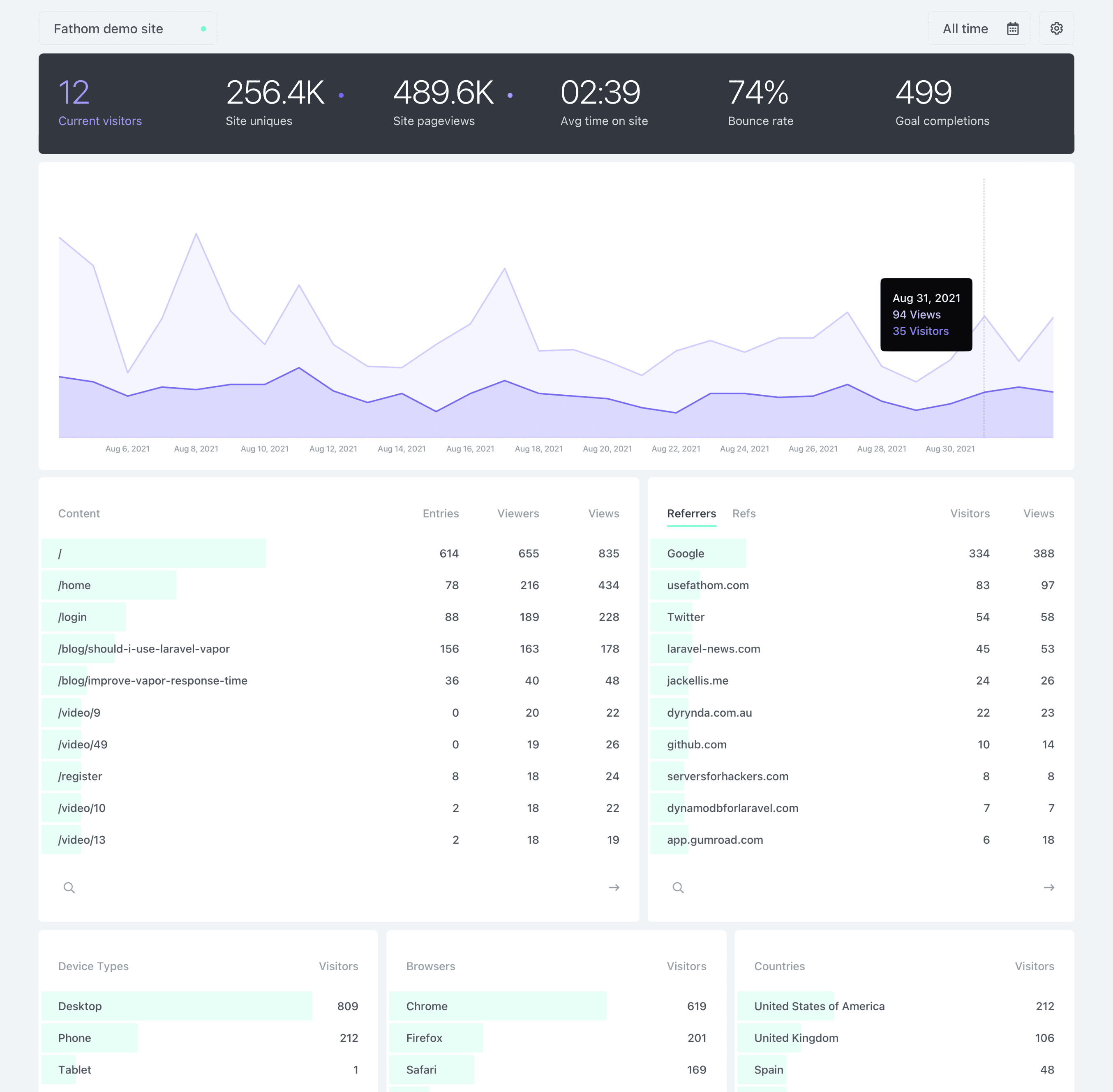We’ve used Google Analytics on many websites over the years. Here’s why we made the switch to Fathom — and why you should make the change, too.
Ever experienced the feeling that you’re being followed online?
You mention a vacation destination to friends. Suddenly hotels and car rentals on that specific island start cropping up in your Instagram ads.
You click on one Facebook ad. Now all your ads are for the same brand and product.
It’s enough to make anybody feel a bit…well…paranoid.
That creepy feeling of being stalked online has a cause — targeted advertising.
Companies run targeted ads based on information collected about your age, interests, location, gender, and more.
Much of that demographic information comes from one company.
Can you guess who?
Yep — Google.
Google tracks visitor data across millions of websites.
You’re probably familiar with Google tools such as Gmail, Docs, Sheets, Analytics, and Search Console.
These tools start with free tiers, but how can Google afford to offer free plans to millions of users?
You’re not paying for the product…because you are the product. Google makes money through its advertising, and your data feeds their ad algorithm.
Google Analytics alone gathers visitor data on over 28 million websites. But that information isn’t just for you, the website owner. Google also uses that data to sell ads, including those targeted ads eerily following people around the internet.
Is it legal for Google to track your data?
Until recently, the question of legality was a bit unresolved. Answers were ambiguous, partially because regulations on tech and digital rights have been slow to emerge.
In January 2022, an Austrian court ruled that Google Analytics violates GDPR. Whether this ruling affects your website specifically may not be clear — but with GDPR fines of up to 20 million Euros, and more online privacy laws appearing each year, it’s better to be safe than sorry.
As privacy laws increase and web behemoths like Google face more legal challenges, website agencies (like us) and website owners (like you) have two options…
- Continually audit website traffic and global privacy laws in a frantic, time-consuming race to stay ahead of ever-evolving legal requirements
- Comply
For us, that decision is easy.
We’re opting for compliance — now and in the future.
To protect our visitors and clients, we’re officially switching from Google Analytics to Fathom.
What is Fathom?
Fathom is a privacy-forward alternative to Google Analytics.
It’s fast, intuitive, and powerful. Organizations of all sizes — from Fortune 100 companies, to governments, to small businesses — trust Fathom to gather and report streamlined, comprehensive website data.
Plus, Fathom ethically gathers and stores visitor information. The team is committed to both audience privacy and empowering website owners with realistic, helpful reporting.
Google Analytics issues were impacting our clients. Fathom fixes many of those flaws.
Every software has problems, and Google Analytics is no exception. Here are some of the largest issues we routinely encountered for our clients.
Google Analytics fails to track visitors with adblockers.
Nearly half of all internet users now have ad-blockers. An estimated 43% of visitors block scripts for tracking, targeted ads, and yes — Google Analytics.
If you rely on Google Analytics to make important decisions, you could easily be missing out on data from half of your website audience. Wouldn’t you rather see all your visitor data, instead of incomplete reports?
Google Analytics skews reporting by tracking bots.
Google’s smart, but its algorithm can be fooled by bot traffic. It’s exciting to see a spike in website traffic, and it’s equally disappointing to discover that the “new traffic” is caused by bots.
You don’t want to make business decisions based on bots, rather than real visitors. And we’re tired of prefacing Google reports for clients with the note that jumps in website traffic may be due to bots.
We’re ready to give our clients more confidence in their data, so they can make better decisions.
Google Analytics code slows site performance.
Reporting isn’t the only problem. Google Analytics can also slow your site performance.
For modern visitors, your website only has a few seconds — or even milliseconds — to make a positive impression. However, Google Analytics causes visitor browsers to load the Google tracking code and a cookie banner.
These delays are small decreases in website load time, but each separate wait adds up.
Google Analytics reports are overly complex.
Google is a powerful analytics tool, but it usually results in major information overload. We’ve found that most clients don’t have time to sift through hundreds of reports in order to find crucial details.
The result? They either don’t check reports at all, or they have to hire external experts just to make sense of their data.
Neither option is sustainable (and we’re all about sustainable, future-planning solutions). Instead, we want an analytics solution that doesn’t require hours of filtering or external research just to find crucial information.
Now for the good news.
We found that solution.
Here’s why we like Fathom much, much more.
Fathom bypasses ad-blockers to collect all website data.
Thanks to its unique script, Fathom gathers and anonymizes visitor data. Where Google Analytics can be blocked by browsers and extensions, Fathom bypasses those blockers.
That means you don’t have to settle for decisions based on just half of your visitor data. Instead, you receive the whole picture — 100% of data from 100% of your visitors.
Fathom organizes reports with an intuitive dashboard.
Fathom reporting is clear, concise, and focused on the data that actually matters.
Fathom’s dashboard has all the important information from Google Analytics — without the extra hundreds of filters or pages of fluff. You can still create filters, drill down to specific pages, view device types, and more.
As a result? You’ll make decisions faster and smarter with only the data you need — instead of having to wade through hundreds of reports.
Fathom retains visitor data anonymously and legally.
How can Fathom track and report so much visitor data without falling for Google’s privacy-exploiting practices?
It’s all possible thanks to privacy-forward policies.
As a software company, rather than an advertising company, Fathom focuses on ethical and anonymous analytics. Users aren’t individually identifiable through its reports, and data storage is GDPR and EU compliant.
That last point is huge and worth its own explanation.
Fathom is GDPR and EU compliant.
The Fathom team keeps privacy and legal compliance top of mind for laws such as GDPR, CCPA, PECR, and more.
Fathom processes EU traffic in the EU. EU traffic is not routed through US-based servers or entities.
Plus, Fathom is a Canadian company. No US entity has access to EU visitor data, making it GDPR compliant even with the recent January 2022 ruling.
Knowing that your website analytics is legal means you have one less thing to worry about now and going forward.
Fathom is better for SEO.
Fathom loads faster and can even improve your site speed.
Remember those delayed load times from Google Analytics? Whereas Google Analytics is 46kb, Fathom is less than 6kb. We even confirmed this information in personal communication with the Fathom founders.
Faster websites mean happier visitors. Happier visitors mean more engagement, trust, and positive perceptions of your business.
Fathom just feels better.
What can we say…it’s woo-woo but true. We feel it’s the right choice to refuse unethical privacy invasions by Google.
We take privacy and our clients’ online welfare seriously. We hope you care, too.
So what does this mean for YOU?
At this point, using Fathom instead of Google Analytics is a no-brainer. With Fathom, you receive more data that’s better organized, legally compliant, and actually helpful — saving you time and enabling you to make better decisions.
If you’re a Studio Anansi client, we’ll help you make the switch.
If you’re on a monthly Studio Anansi WordPress Care Plan or WordPress Hosting, we’re providing Fathom for your site for free. Fathom is now part of our premium tools suite, available to monthly plan holders at no charge.
We’re transitioning clients onto Fathom in Spring 2022. You’ll receive an email with further details and what to expect.
Not a Studio Anansi client? No problem.
We can still help with your Fathom setup. Try a free Fathom trial, or get in touch and we’ll handle everything for you — no need to touch a line of code.
FAQ: Google Analytics, GDPR, and Fathom
Is Fathom GDPR compliant?
Fathom complies with GDPR, CCPA, ePrivacy, PECR, and other privacy laws. Learn more here.
Is WordPress GDPR compliant?
Generally speaking, yes — WordPress core software is generally GDPR compliant. Ever since WordPress version 4.9.6, new updates have enhanced WordPress GDPR compliance by adding more user consent tools, data export and erase options, and a default privacy policy.
That said, website platforms and regulations are constantly changing. No single platform or tool can guarantee 100% compliance, especially in the long term. And if you have any analytics tools on your site, they may not be GDPR compliant..
Do blogs need to be GDPR compliant?
Generally speaking, yes. If you have website traffic from the EU, then GDPR should be on your mind. Is it likely that a small personal blog in the US will be fined for failing to comply with GDPR? No…but other privacy laws are getting stricter all the time, moving closer to GDPR’s privacy protection even in the US.
Does my website need to be GDPR compliant?
Again, generally yes. See the question above, and keep in mind — the likelihood that you’re fined for failing GDPR compliance is low. But from an ethical and future-planning perspective, compliance is a smart step.
Is Google Analytics GDPR compliant?
It doesn’t seem to be compliant, no. Identifiable visitor information is not anonymized, data is stored in the US, and US-based entities can have access to collected data.
Can I switch to Fathom from Google Analytics?
Absolutely. Try a free Fathom trial, or get in touch and we’ll handle everything for you.
Disclaimer: We’re not lawyers…and we haven’t even played one on TV. Nothing we write is legal advice.







